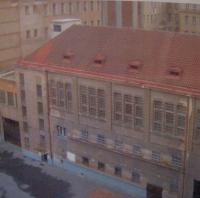“Signatories of Charta 77 presented a special group of political prisoners. They were given preferential treatment, unlike any other prisoners.”
Antonín Šurýn was born on the 16th of March in 1914 in Vranovice in South Moravia. After he finished elementary school, he was trained in milling in the Škoda Plzeň facility. During his military service, he accepted an offer to study at the high school of Prison Service in Ostrov nad Ohří. In 1967, he became a warden in a prison in the town of Příbram. He had worked there until 1969. He experienced prisoner’s revolts after Czechoslovakia was invaded by joined armies of the Warsaw Pact in August 1968. Beginning 1969, he worked in Prague in the prison of Pankrác as a member of the third class squad. Later he was moved to Ruzyně prison. There he worked as a photographer in an inner reception section. He met many signatories of Charta 77, among others Václav Havel. Since 1989, he has lived in Prague. He is a partly invalid pensioner.
